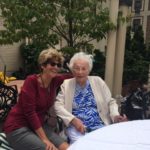My “old ladies,” a cadre of role-model older women whose friendships I’ve cultivated for the last 25 years, don’t know each other. Except for 88-year-old Betty and Marge, 101, who both live in my building, the rest either can’t meet or don’t want to. And yet, I keep thinking they might like each other.
Twenty-plus years earlier, I introduced my Aunt Ruth to Henrietta. I described Henrietta as “a great older woman” I’d met in a fiction-writing class at the New School. I didn’t tell her that when I first saw Henrietta and the other enrollees, I said to myself , Oh, no a bunch of old people. I was 50 and Henrietta 75 — the age I am now.

My elegant and sophisticated aunt stiffened when our cab stopped in front of Henrietta’s building. Ruth was born privileged, blessed with movie-star looks. She lived in a five-bedroom house in a tony New Jersey suburb. Ruth was brilliant and insightful but never had a job and loved to tell people that she “couldn’t boil water. ”
Henrietta was on her own. When her late husband fell ill, she was only 48. After his death, she supported her son and herself by writing and selling how-to books out of her Lower East Side apartment. At 88, when she and my aunt met, Henrietta was legally blind and walked with a cane, but she managed the subways and took classes all over the City. Ruth was amazed by Henrietta — but they had little to talk about.
Cut to the present. The idea of planning lunch for my old ladies. a group of strangers, ranging from 91 to 100, was inspired by a conversation last fall with Judy, who worked as a school administrator until she was 91. She’s my daughter’s college friend Becky’s mother-in-law. For the past many years, our families have come together for “break fast” at Becky and Jamie’s Upper East Side apartment. This year, Judy talked about “adjusting” to retirement. She didn’t have as many opportunities to socialize and rarely spent time with people her age. Many of her contemporaries were gone.
Judy was receptive to the idea of meeting new people, and when I pitched it to Marge and Lucille, 91, they said “yes,” too. (Betty was out of town.) Sylvia, still a social butterfly at 96, claimed she was “too busy.” (Months later, over lunch for two in Miami, she admitted to me that she also wasn’t interested: “I’m sure they’re nice, but I’d rather spend time with young people. All old people talk about is what’s wrong with them.”
The day of the lunch, Judy canceled — a forgotten doctor’s appointment. Marge and Lucille showed up and were polite to each other. But they had nothing in common except me!
Seriously, did I — once again — expect complete strangers to hit it off because they had advanced age in common?

Marge is probably New York’s — or maybe the world’s — oldest living stock trader (“No,” she recently corrected me, “I invest”). She religiously reads the Times, the Journal and Barron’s. Lucille worked as a tutor, and is beginning to have memory lapses. Lucille and I share a place we both know and love: Fire Island. Marge has never been there.
Since that unsensational lunch, I’ve learned although all people are different, older women — Marge and Lucille, Aunt Ruth and Henrietta — are VERY different from each other.
Because of varied life experiences, older people are even more different from each other than children or young adults are. Their long history of work experiences, their relationships with friends and family, and the changes they have seen in their lifetimes have influenced every aspect of their lives. — Walk in My Shoes, an Illinois 4-H project
And so, that’s the last time I’ll plan a lunch for more than one of “my old ladies” at a time.
I should explain: I call them “my old ladies” in the same way a guy might refer to his “old lady” — the little woman at home who cares for him. My old ladies take care of me in my head. They tell me how to accept, to change, and to cope. They didn’t become “good” when they “got old.” They were capable and wise throughout their lives. And they’re still using those resources to get through what is arguably their most challenging stage of life.
Although friends love to hear stories about my old ladies and urge me to write a book about what I’ve learned from them, they warn me: “You have to come up with a better title.” Many ask, “Do they know that you call them ‘old ladies’ and, if so, aren’t they ‘insulted’?” Just the other day, a friend who is 20 years younger — she and regards me as one of her old ladies — suggested that “older” mighter be a more palatable adjective than “old.”
In any case, labeling is not the problem here. Lumping my old ladies together is. From now on, I’ll enjoy each woman for the unique presence she is. It’s the same with my grandsons. If I don’t spend one-on-one time with each of them, they morph into “the boys.” That special something that happens in a duo can’t happen with three or more.
Besides, my other friends and acquaintances don’t necessarily like each other. It’s even more unlikely that my old ladies will!